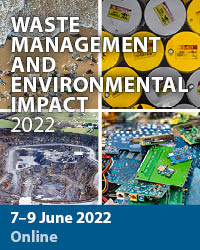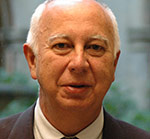Waste Management and Environmental Impact 2022
11th International Conference on Waste Management and Environmental and Economic Impact on Sustainable Development
![]()
7–9 June 2022
Online
Overview

With the main objective to preserve our delegates’ wellbeing, but also with the belief that the international contacts among the scientific community should not be stopped, WIT decided that this conference should not take place as scheduled in Madrid, Spain, but take place as an online event instead. The conference was organised by the Wessex Institute, UK, represented by Prof Juan Casares; the University of Naples, Italy, represented by Prof Massimiliano Lega, and Insubria University, Italy, represented by Prof Elena Rada. This conference merged two successful events organised by the Wessex Institute, the International Conference on Waste Management and the Environment which started in Cadiz, Spain in 2002; and the International Conference on Environmental and Economic Impact on Sustainable Development which originated in 2012 in Ancona, Italy. Waste management is one of the key problems of modern society due to the ever-expanding volume and complexity of discarded domestic and industrial waste and its implications on health and the environment. Society is increasingly aware of the need to establish better practices and safer solutions for waste disposal. This creates a need for more research on current disposal methods such as landfills, incineration, chemical and effluent treatment, as well as recycling, clean technologies, waste monitoring, public and corporate awareness and general education. Focus should also be placed on the impact of economic constraints on the environment, taking into account the social aspects as well as the over-use of natural resources, contamination and toxicity.
Opening of the Conference
The conference was opened by Prof Juan Casares, Wessex Institute Board of Directors, who welcomed the delegates to the event on behalf of all Chairs.
Invited Speakers
There were a series of invited lectures on advanced topics of research and applications, as follows:
- Hierarchical monitoring of water quality: coordinating spatiotemporal resolution of multilayer and multispectral sensors to characterize pollution
by G. Medio, V. Severino, R. Teta, T. Endreny & M. Lega - Attribution of pollution discharges in coastal waters during Covid-19 lockdown using remote sensing and bioindicators
by M. Lega, G. Medio, T. Endreny, V. Costantino & R. Teta - Is the United Kingdom’s hydrogen strategy an effective low carbon strategy?
by F.Baker - Constraint mapping for avoiding adverse effects of development: the application to point Wilson and its aftermath
by B. Jenkins - COVID-19 and municipal solid waste management
by E. C. Rada
Conference Sessions
The papers presented during the conference were classified under the following headings:
- Environmental strategies and tactics
- Waste monitoring and management
- Circular economy
- Environmental and economic education
There was also a special session by Prof Elena Rada “Strategies for Waste Management: EU and non EU case studies”
Q&A Live Zoom Sessions
Conference delegates were invited to participate in two Q&A live zoom sessions which took place on 7th and 8th June 2022. These friendly sessions were a great opportunity for participants to interact with each other and put questions to authors about their papers.
Conference Publication
pers presented at this conference are published in Volume 257 of the WIT Transactions on Ecology and the Environment ((Electronic ISSN: 1743-3541). Papers presented at the meeting are available Open Access in the eLibrary of the Wessex Institute (https://www.witpress.com/elibrary) from where they can be freely downloaded by any interested parties.
Closing of the Conference
We are very sorry that we were not able to meet our delegates in person this time, but hope that we will be able to do so at a future event.


 Wessex Institute
Wessex Institute